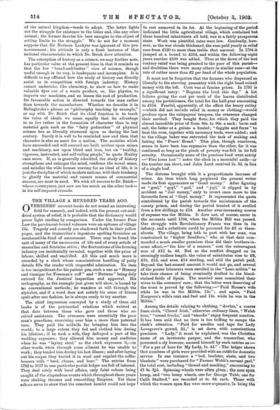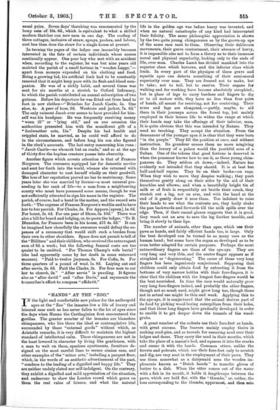THE VILLAGE A HUNDRED YEARS AGO.
OVERSEERS' account-books do not sound an interesting field for research, and indeed, with the present cut-and- dried system of relief, it is probable that the dictionary would prove light reading by comparison. Under the former Poor Law the parchment-bound volumes were an epitome of village life. Tragedy and comedy are shadowed forth in their yellow pages, and the transcriber's ingenious spelling furnishes an inexhaustible fund of amusement. There may be found the cost of many of the necessaries of life and of every article of masculine and feminine attire ; the fluctuations of the farming industry are incidentally revealed, together with the price of labour, skilled and unskilled. All this and much more is recorded by a clerk whose conscientious handling of petty details fills the reader with respectful admiration. No item is too insignificant for his patient pen, such a one as " Honney and vinnigar for Freeman's coff " and " Battens " being duly entered for the Justices' inspection and approval. His orthography, as the example just given will show, is bound by no conventional methods; he wanders at will through the alphabet, and if a word does not satisfy his sense of fitness spelt after one fashion, he is always ready to try another.
The chief impression conveyed by a study of these old books is of the patriarchal relations which existed at that date between those who gave and those who re- ceived assistance. The overseers were essentially the poor man's guardians, exercising over him a more than paternal care. They paid the midwife for bringing him into the world ; to a large extent they fed and clothed him during his lifetime ; if he took a wife, they defrayed a part of the wedding expenses ; they allowed him money and medicine when he was "laying steel," as the clerk expresses it,—in other words, when through some ailment he VMS unable to work ; they tended him during his last illness; and after laying out his corpse they buried it in wool and regaled the coffin- bearers with "bred, cheese, and bear." The entries from 1782 to 1317 in one particular parish ledger are full of interest. They deal solely with local affairs, only faint echoes being caught of the stupendous events which throughout those years were shaking thrones and remoulding_ Empires. Yet these echoes serve to show that the remotest hamlet could not hope to rest unmoved in its lot. At the beginning of the period indicated the little agricultural village, which contained but three hundred inhabitants all told, was in a fairly prosperous state. Work was plentiful, rates were low. Gradually, how- ever, as the war clouds thickened, the sum paid yearly in relief rose from 2120 to more than treble that amount. In 1794 it jumped at a bound to £554, and within the following eight years another 2100 was added. Thus at the dawn of the last Century relief was being granted to the poor of this parish— and doubtless there were many others in similar case—at the rate of rather more than 22 per head of the whole population.
It must not be forgotten that the farmers who dispensed tio liberally to the starving peasantry with the right hand coined
money with the left. Corn was at famine prices. In 1795 is a significant entry " Begann the bred this day." A list follows giving the cost per week of the loaves distributed
among the parishioners, the total for the half-year amounting to 2154. Fearful, apparently, of the effect the heavy outlay —which did not include relief in money or clothing—would produce upon the ratepayers' tempers, the overseers changed their method. They bought flour, for which they paid the almost incredible price of from 86s. to 90s. a sack; barm and
salt, the latter at a guinea a bushel; " faggite and furze" to heat the oven, together with necessary tools, were added'; and to the village baker was entrusted the task of making and baking the " Poors' Bread." This plan, though cumbrous, seems to have been less expensive than the other, for it was continued so long as the pinch of poverty was felt in its full severity. Occasionally some of the precious food went astray —"Five loves lost"! notes the clerk in a mournful aside—or the number ran short, and John Lord received 2s. 3d. in lieu of a single loaf.
The distress brought with it a proportionate increase of crime. An item which long perplexed the present writer made its first appearance as " Goall money." After figuring as "goal," " goyl," " goil," and " joyl," it slipped in by accident as "Jail money," only to revert once more to the favourite form of " Goyl money." It represented the quota contributed by the parish towards the maintenance of the county prison, and during the period treated of it swelled from a few shillings to 214. Another ever-increasing source of expense was the Militia. It does not, of course, occur in the accounts until 1794, when the Militia Bill was passed. Our struggle with Revolutionary France was then in its infancy, and a substitute could be procured for 23 or there- abouts. The village, being loth to part with her sons, was constrained to "higher Souldiers," who at that date corn.' mended a much smaller premium than did their brothers-in- arms afloat,—" the hior of a seaman" cost the extravagant sum of 212 4s. 4d. But as the conflict dragged on its seemingly endless length, the value of substitutes rose to 29, 210, 212, and even 214 sterling, and still the parish paid. Beyond the last-named amount it would not go, and several of the poorer labourers were enrolled in the "Loco militia" to take their chance of being eventually drafted to the blood- stained fields of Spain. The married men committed their wives to the overseers' care ; that the latter were deserving of the trust is proved by the following:—" Paid House's wife while he was in the Militia, 13s." ; and again, "Paid Norgrove's wife's rent and fuel and 12s. while he was in the Militia."
Among the details relating to clothing, " dowLas," a coarse linen cloth, " Clered Irish," otherwise ordinary linen," Welsh hose," "round frocks," and "smocks" enjoy frequent mention. It has been said that no item is too trifling to escape the clerk's attention. "Paid for needles and tape for Lady Lovegrove's gownd, 2d.," is set down with conscientious precision. "Lady," it must be explained, was the Christian name of an inveterate pauper, and the transcriber, who possessed a sly humour, amused himself by such entries as:— "For a per of hose for My Lady, is. 4d." The ledger shows that numbers of girls were provided with an outfit for domestic service. In one instance a "bed, boulster, shete, and two blankets" were purchased for "Farmer Webb's servant garl," the total cost, including "thread and mocking," amounting to 21 88. 31d. Spinning-wheels were often given ; the men Rpm hemp, and "two hemp wheels, one for George Tubb, one for Calib Stallerd," are recorded at 4s. 6d. each. Tliose with which the women spun flax were more expensive, 7s. being the
usual price. Seven days' thatching was remunerated by the lump sure of 10s. 6d., which is equivalent to what a skilled modern thatcher can now earn in one day. The roofing of three cottages, inclusive of straw, sprays, poolers, and labour, cost less than does the straw for a single house at present.
In turning the pages of the ledger one insensibly becomes interested in the fate of certain individuals whose names continually appear. One poor boy who met with an accident when, according to the register, he was but nine years old mulcted the parish of a small fortune in "wooden -Leggs,"- apart from moneys expended on his clothing and food. Being a growing lad, his artificial limb had to be constantly renewed that it might keep pace with its flesh-and-blood com- panion. He was of a sickly habit, and several times VMS sent for six months at a stretch to Oxford Infirmary, to which the parish contributed an annual subscription of two guineas. Before his departure he was fitted out from head to foot in new clothes—" Brieches for Jacob Castle, 5s. One shoe, 4s. A peer of hose, 9d. Westcote and jackut, 7s. 6d." The only raiment Jacob ever seems to have provided for him- self was his headgear. He was frequently receiving money "wean ill" or "lying stil," and on one occasion the authorities presented him with the munificent gift of a "loulweather cote, 15s." Despite his bad health and crippled state, he married, as he could well afford to do in the circumstances, and before long his son also figured in the clerk's accounts. The last entry concerning him runs : "Jacob Castle—no whoarck but on roads," and so at the age of thirty-five the hapless creature passes into obscurity.
Another figure which arrests attention is that of Frances Norgrove. The overseers equipped her for domestic service and sent her forth into the world, whence she returned with damaged character to cast herself wholly on their goodwill. %he loss of her reputation proved no bar to matrimony. Some years later she was married by license—a most unusual pro- ceeding in her rank of life—to a man from a neighbouring county who must have possessed some means, though he was not sufficiently educated to sign his name in the register. The parish, of course, had a hand in the matter, and the record sets forth: " The expense of Frances Norgrove's weddin and to have her to hur parrish. For Cloake, 5s. For Apporn [apron], is. 6d. For bonet, 2s. 6d. For one pear of Shoes, 3s. 10d." There was also a bill for board and lodging, or, to quote the ledger, "To B. Bhmsdon, for Frances been in his house, 211 4s. 3d." It can be imagined how cheerfully the overseers would defray the ex- penses of a ceremony that would shift such a burden from their own to other shoulders. Space does not permit to tell of the "Billiters" and their children, who received the extravagant sum of 8d. a week ; but the following funeral costs are too quaint to be omitted. "For Thomas Champ's wife burial" (she had apparently come by her death in some untoward manner). "Paid to twelve jurymen, 8s. For Cofin, 8s. For three quarters of a pound of wool, is. 8d. Laiying out and after semis, 2s. 6d. Paid the Clarke, 2s. For four men to car hor to church, 2s." "After servis " is puzzling. It figures also as "after david " and "after Davis," and represents the tra,nscriber's effort to compass "affidavit"



























































 Previous page
Previous page